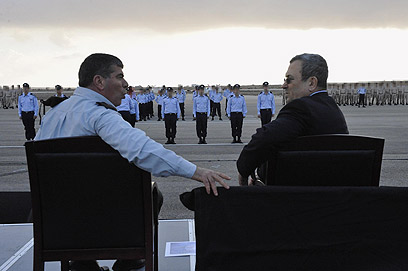



State Comptroller Yosef Shapira on Sunday released his report into the Harpaz affair and concluded that while there was no attempted coup of top army leadership there was evidence of official misconduct.
Attorney General Yehuda Weinstein will now decide whether there is room to launch a criminal investigation.
Related Stories
- Comptroller's Harpaz draft report criticizes Barak
- Draft report on Harpaz affair criticizes Ashkenazi
- Barak testimony highlights discord in top army ranks
The report, which was mostly assembled under the previous State Comptroller, Micha Lindenstrauss, is based on materials from the chief of staff's bureau which records all telephone calls. There had been no access to materials from the defense minister's bureau as some of the CDs had been deleted, though not intentionally.
The "Harpaz document" was a forged paper prepared by Lt. Col. Boaz Harpaz in an attempt to thwart the candidacy of Major-General Yoav Galant as the next IDF chief of staff and was first exposed in August 2010. It contained guidelines to building up a positive image for Galant and discrediting Ashkenazi and Benny Gantz.
Then IDF Chief of Staff Gabi Ashkenazi believed that Barak had devised a plan to undermine his authority and shorten his term. The defense minister, on his part, was under the impression that Ashkenazi had thought up a plan to secure himself a fifth year in office and prevent the appointment of Galant as his successor.

Harpaz after release from custody (Photo: Ohad Zwigneberg)
Both were wrong, the comptroller ruled, as there were no organized plans. Nevertheless, Shapira did find evidence for misconduct.
The comptroller's report determines that the "bad blood" between Barak and Ashkenazi bureaus cannot justify the collection of information on the defense minister with even partial knowledge by Ashkenazi.
It also criticizes the conduct of the former IDF chief and his close aide, Colonel Erez Weiner, once they became aware of the Harpaz document.

Barak and Ashkenazi (Photo: Ariel Hermoni, Defense Ministry)
The document, which police found to have been forged by Harpaz alone, presented a plan to undermine Ashkenazi and advance Galant's appointment as chief of staff. Having learned of its existence, Ashkenazi failed to turn it over to the military advocate general or the attorney general.
Shapira stated that by avoiding to explore the matter, Ashkenazi had contributed to the fact that senior officers and other officials received unfounded information. Ashkenazi had testified later that there had been an "error in judgment."
The report harshly criticizes Weiner for giving out copies of the Harpaz document in direct contradiction to Ashkenazi's orders and for cooperating with Harpaz on collecting information on Barak and his bureau chief Yoni Koren. Shapira concluded that his conduct was not befitting a senior officer in the IDF.
Ashkenazi was criticized for not putting a stop to the Weiner-Harpaz efforts and showing willingness to receive the information they collected on Barak.
Ashkenazi strayed from 'basic principles of hierarchy'
The fact that faults were also found in Barak's conduct toward Ashkenazi did not justify the "straying from basic principles of hierarchy," the report said. Shapira described Weiner's conduct as "wrong" and not in line with Israel's Military Basic Law and Ashkenazi's behavior as "unbefitting."
The report also criticized Barak and his staff and listed the various acts performed against the IDF chief's bureau. The minister had delayed 157 out of 170 senior IDF appointments for a period of eight months until the end of Ashkenazi's term.
The report also found faults in the appointment of Deputy Chief of Staff Yair Naveh noting that Barak failed to inform Ashkenazi of his choice despite the fact that the latter was responsible for all appointments of major-general positions.
The State Comptroller also criticized Barak for issuing a statement announcing that Ashkenazi's term won't be extended for a fifth year, 10 months before he completed his term "for ethical, professional and normative issues." Shapira said that there was no room for such a statement without thorough investigation.
The report also noted that Prime Minister Benjamin Netanyahu, who had been aware of the strained relations between Barak and Ashkenazi, should have intervened in the crisis "especially given the security challenges Israel faces."
The State Comptroller further noted that senior officials in Military Intelligence continued to consult with Harpaz without first examining his security clearance, even after he was discharged from the army.
The report described the manner in which sensitive intelligence material was revealed in 2000, as well as Harpaz's actions within the Defense Ministry and the IDF Chief of Staff's bureau
In response to the report, the Defense Ministry said that "The report is not the end but the beginning of a legal investigation into the matter, in order to expose the truth and mend the faults revealed. What we now need is a criminal investigation and a State investigative committee."
Ashkenazi said that he is pleased that the State Comptroller has rejected the charges leveled at him by the defense minister and his associates. He noted that he had already admitted an error in judgment by not forwarding the document to the attorney general and accepts the criticism in this context.
- Receive Ynetnews updates
directly to your desktop















